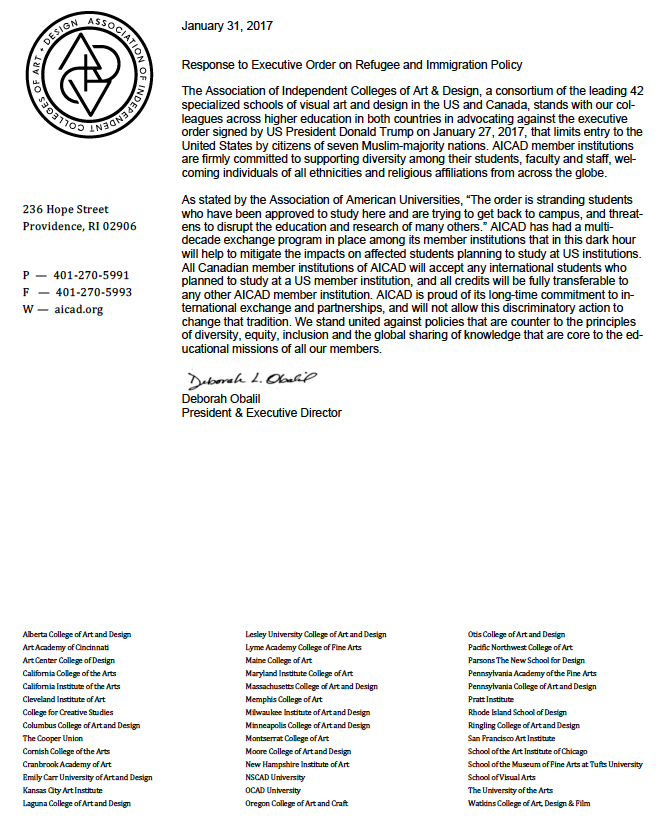Art World
Art Schools React to Donald Trump’s Travel Ban
Heads of Cooper Union, RISD, Bard, and Carnegie Mellon School of Art weigh in.
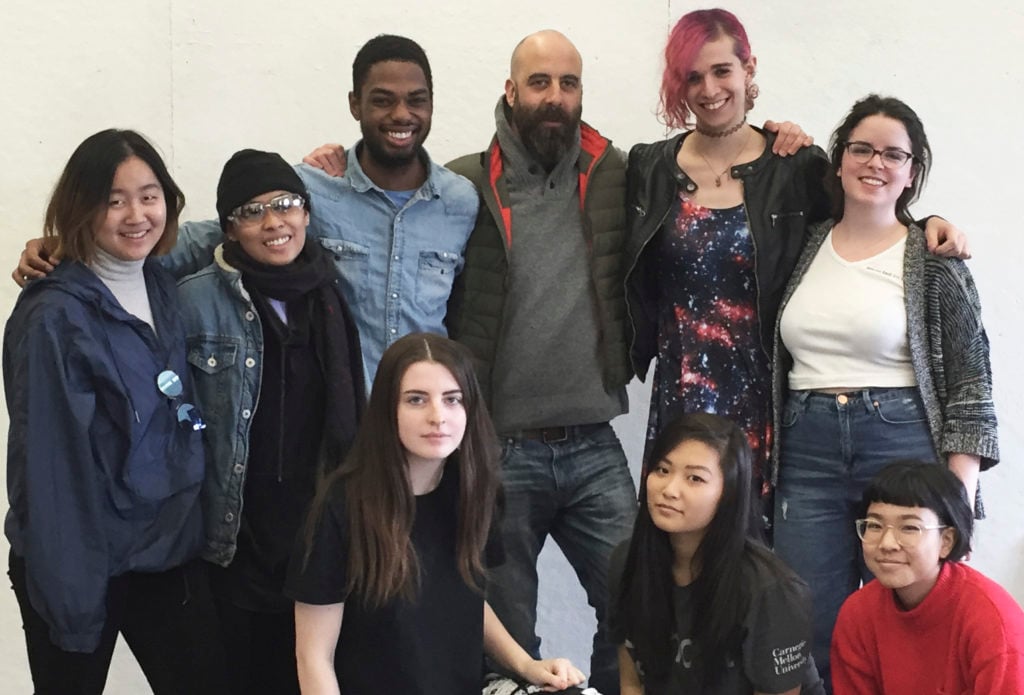
Heads of Cooper Union, RISD, Bard, and Carnegie Mellon School of Art weigh in.

Artnet News

President Donald Trump’s Friday afternoon executive order instituting an emergency ban on travel from seven Muslim-majority countries—Iran, Iraq, Libya, Somalia, Sudan, Syria, and Yemen—sparked a wave of panic and outrage across the country.
The Association of American Universities issued a statement urging “the Administration, as soon as possible, to make clear to the world that the United States continues to welcome the most talented individuals from all countries to study, teach, and carry out research and scholarship at our universities.”
A variety of art school heads have also issued statements, cautioning students and faculty against travelling and expressing dismay at the effects the executive order has on cultural exchange.
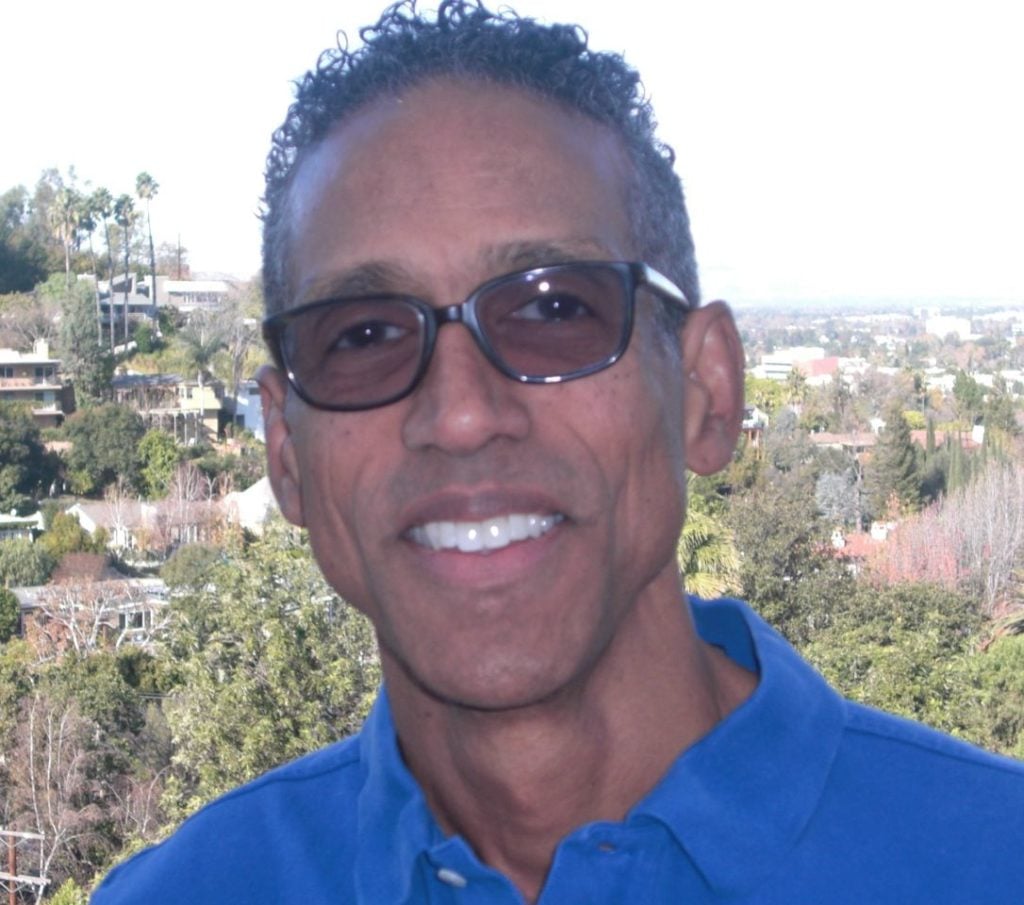
David Roussève, interim dean of UCLA School of Arts and Architecture. Image courtesy UCLA.
One of the stronger statements came from David Roussève, the choreographer, writer, director, filmmaker, and currently interim dean of the UCLA School of Arts and Architecture. It began with a general statement on behalf of the institution:
Sometimes concision is required. So, let me be concise: The Dean’s office condemns in the strongest possible terms the executive order around visas and immigration released by the President this past weekend.
Roussève then offered a more personal viewpoint:
Dear Students: Sometimes education occurs outside the classroom and the studio, and sometimes issues transcend party and political beliefs. As an affront to the values that form the very core of our democracy and your education, I believe that the recent executive order fits into both of those categories. I encourage you to think about how these issues affect your lives, but then to take action.
Conversations and actions are happening around our school in a myriad of ways. Last weekend a performance I choreographed based on a musical work of South African author Alan Paton’s novel “Cry the Beloved Country” was presented by UCLA Center for the Art of Performance at Royce Hall. We used that performance to begin conversations around the warning apartheid South Africa offers us on the destruction that hate and division can bring. In the lobby I saw Claudia Bestor the Director of Public Programs at the Hammer Museum, who reminded me that the Hammer is screening “I am not Your Negro” tonight [January 30] (in my opinion there is much to learn from James Baldwin on possible ways to survive when your values are affronted). World Arts and Cultures/Dance Chair Lionel Popkin had to run home after the performance to rest since he spent his entire Sunday at LAX in protest—as I know many other members of our community did.
I am not trying to dictate how you respond. This is, of course, your choice based on your belief system. But whatever your response may be—whether making art or directly protesting or calling your congressperson or donating to the organization of your choice that is fighting for your perspective—I encourage you to contemplate the consequences of this weekend’s executive action and then to express yourself. And please know that the school, the university, and the UC system are doing what they can to have your back while you do so.
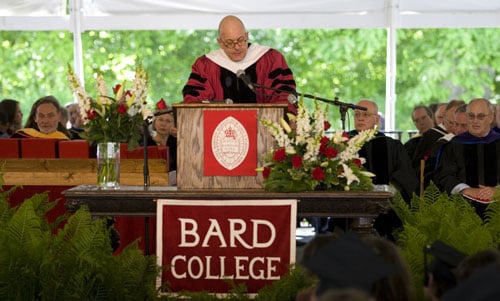
Bard College President Leon Botstein. Image courtesy Bard.
Leon Botstein, president of Bard College, issued the following to his campus:
I am writing to inform all of you that Bard College will do everything in its power to protect our international students, faculty, and staff from abroad as well as immigrants within the student body, faculty, and staff throughout the Bard network.
The recent directives from President Trump demand careful scrutiny with respect to their implications. However, I believe that Bard must sustain its commitment to the principle of non-discrimination by reason of race, religion, or national identity. Bard is part of an international community of students and scholars and it will hold fast to attracting and retaining students, faculty, and staff from all over the world.
Bard has a long and proud history as a haven for refugees, first in the 1930s and again after the failed Hungarian Revolution of 1956.It will continue to honor the humanist traditions of higher education, Bard’s own history, and above all the ideals of the United States and the principles of its Declaration of Independence and its Constitution.
Bard will support and protect students without reference to their immigration status. Bard will admit students in a non-discriminatory manner with regard to religion, race, and national origin. Bard supports the BRIDGE Act and will continue to admit and support undocumented students. What the call for “extreme vetting” and the ban on immigration from certain nations mean for colleges and universities is not yet clear. But Bard will join the appropriate inter-institutional efforts to protect individuals dedicated to scholarship and teaching from all nations and religions.
I am an immigrant, a naturalized citizen whose family came stateless to this country. My deep patriotism for America is rooted in that experience. That patriotism is attached to the laws and ideals of the United States.
Our country was not always hospitable to refugees and immigrants. It was essentially closed from the 1920s until the mid 1960s. It turned away refugees from Nazi Europe. We cannot now permit our country to return to the America First isolationism of the 1930s and redefine itself as place of xenophobia, intolerance, and discrimination.
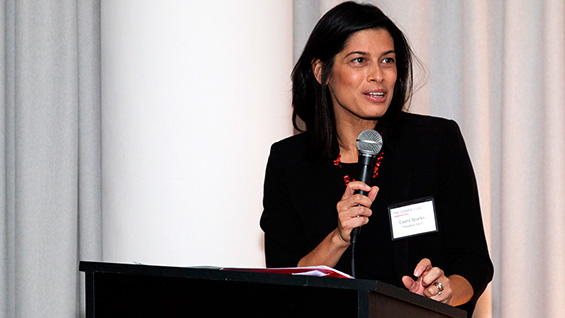
Laura Sparks. Image courtesy Cooper Union.
Laura Sparks, the new president of Cooper Union, sought to reassure “Students, Faculty, and Staff”:
…The Cooper Union is an institution—and a vibrant community—built on core principles of equity regardless of religious, racial, economic, or gender background.
I have tasked our Dean of Students Chris Chamberlin, in close collaboration with me, to lead the effort on ensuring we are actively providing support to those in our community impacted by the recent executive order. This will be a team effort and will engage partners across The Cooper Union to ensure the safety of our community. We are also in touch with our neighboring universities to share information in our collective efforts to ensure that all of our communities have the best and most up-to-date information. Chris and others have already been in touch with students who could be impacted. If you believe you could be impacted and have not already spoken with someone at Cooper who can help, please reach out to Chris, your academic dean, a faculty member, or your supervisor. Within all of our legal rights, we remain committed to the privacy of our students, staff and faculty.
It is important that we take active care of every member of our Cooper community. We must hold onto our core values of justice, fairness, diversity, and inclusion that are hallmarks of The Cooper Union.
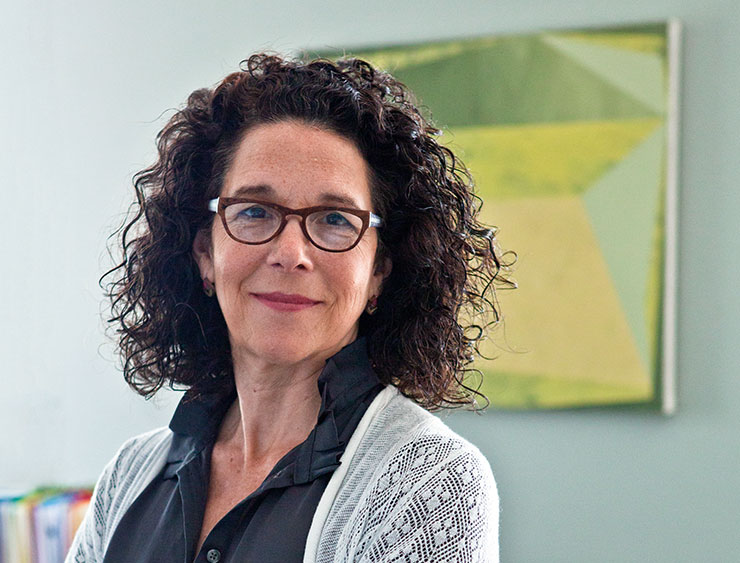
Rosanne Somerson. Image courtesy RISD.
Rosanne Somerson, president of RISD in Providence, said that the school would “continue to monitor the situation closely and seek to assist anyone in the community who needs help.” She added:
Prior to this order, I joined several hundred other college presidents and chancellors in signing a petition launched by Pomona College in support of DACA, the Deferred Action for Childhood Arrival program, and undocumented immigrant students. If you wish to act and to add your individual voice to this call, you may consider signing onto this statement.
I want to state unequivocally that RISD does not endorse any form of discrimination. Such actions are contrary to our institutional values. Our mission is global in nature and our community represents more than 60 nations, a fact of which we are immensely proud. We know that a vital community is inclusive and celebrates all identities. While these are days of heightened anxiety for many in our community, we will continue to uphold our values and protect any vulnerable community members. It is essential that we are guided by and remember these core values, and that we take extra care to help and respect each other.
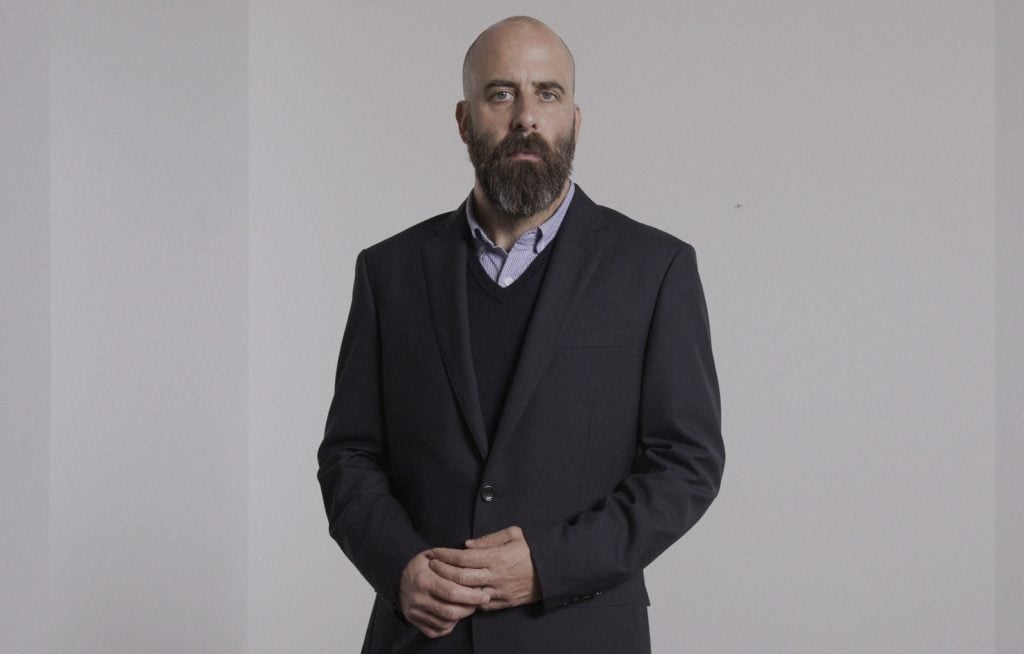
Charlie White, head of the School of Art at Carnegie Mellon. Image courtesy Carnegie Mellon.
Charlie White, head of the School of Art at Carnegie Mellon University in Pittsburgh:
I wanted to reach out to our faculty, students, alumni, colleagues, and many friends in the arts to express the School of Art’s commitment to a diverse and global community. At a moment when we must each examine our own moral compass and reflect upon our ethical beliefs, I believe it is important for us as artists and art educators to take account of our history and the value of inclusion that has so greatly shaped American society.
From Andrew Carnegie, the founding figure of our university and a Scottish immigrant whose family came to America for greater opportunity; to our most influential alumnus, Andy Warhol, a first-generation American whose family emigrated from Ruthenia (modern-day Slovakia); to our university president, Dr. Subra Suresh, who was born in Mumbai, and our provost, Dr. Farnam Jahanian, who was born in Iran, we are preceded and surrounded by those who came to America to exercise their freedom and forward-thinking ideas to the betterment of all.
In light of the recent executive orders from the White House affecting immigration and entry into the U.S. for nationals of seven countries, the School of Art expresses our concern and offers our complete support to any of our students who may be affected, or who have family and friends who may be affected. The School of Art’s diversity, within the greater diversity of a leading international research university, is a pillar of its ongoing accomplishments and future promise. The School of Art is a home to students from around the globe and across economic and cultural spectrums; it is a space of unwavering support for LGBTQ cultures; and it is a location for the pursuit of new ideas, new forms, and open critical discourse.
The School of Art is made up of a community of artists united by the belief that creative expression and critical thinking require a rich ecosystem wherein multiple cultures inform and learn from each other. It is from these shared beliefs that the space of art school becomes one of progress, inclusion, experimentation, and conceptual freedom, and it is this open and inclusive environment that I am committed to maintaining as head of school.
UPDATE: The Association of Independent Colleges of Art and Design (AICAD), a consortium of US and Canadian art schools, has responded to the executive order, stating that “[a]ll Canadian member institutions of AICAD will accept any international students who planned to study at a US member institution, and all credits will be fully transferable to any other AICAD member institution.”
The full letter is embedded, below:
